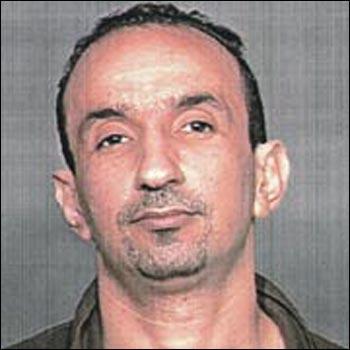 Abdel-Ilah Elmardoudi On September 17, 2001, six days after the terrorist attacks in New York City and Washington, D.C., FBI agents raided an apartment in Detroit searching for a man on the FBI watch list of suspected terrorists.
They did not find the man they were looking for, but they did find three North African immigrants— Karim Koubriti, Ahmed Hannan and Farouk Ali-Haimoud. They also found the photograph of another man, Youssef Hmimmssa, who was arrested not long after in Iowa.
All four were indicted on September 27, 2001, on charges of misuse of visas and fraud in connection with identity documents.
Similar charges were later filed against Abdel-Ilah Elmardoudi.
On August 28, 2002, Koubriti, 22, Hannan, 32, Elmardoudi, 35, and Ali-Haimoud were charged with conspiracy to provide material resources or support to terrorists. The indictment accused them of planning to acquire missiles and shoe and truck bombs and plotting attacks on Comerica Park, Disneyland, Las Vegas, a U.S. airbase in Incerlik, Turkey and a hospital in Amman, Jordan. The indictment was secured in part on the testimony of Hmimmssa, who had been charged in the case, though not with terrorist activities, and who pled guilty in exchange for his cooperation against his co-defendants.
Following lengthy jury selection, the trial began on March 26, 2003—the first terrorism trial in the wake of the 911 attacks. The trial featured the testimony of Hmimmssa, who said Elmardoudi told him about the possibility of attacks on the United States a month prior to the September 11th attacks. He described the defendants as Islamic extremists who sought to provide weapons to the Middle East and help fellow countrymen enter the U.S.
The prosecution also presented sketches they found in the apartment that they said showed one of the targets they intended to attack.
On June 3, 2003, Elmardoudi and Koubriti were convicted of supporting terrorism and document fraud conspiracy. Hannan was convicted of document fraud and Ali-Haimoud was acquitted.
After the trial, a heated legal battle ensued over leaks to the media as well as alleged violations of a court gag order by U.S. Attorney General John Ashcroft.
On October 15, 2003, in the midst of this dispute, lawyers for the defendants petitioned for a new trial, alleging prosecutorial misconduct—that documents were withheld by the prosecution.
Among the withheld documents was evidence that the prosecutors knew the sketches were harmless drawings of the entire Middle East region. Prosecutors also withheld a note from a man who was in jail with Hmimmssa and talked to him about lying to the FBI regarding the defendants’ ties to terrorism. U.S. District Court Judge Gerald Rosen said, “The prosecution materially misled the court, the jury and the defense as to the nature, character and complexion of critical evidence.”
The Justice Department moved to set aside the convictions and on September 2, 2004, the charges were dismissed.
The prosecutor on the case, Richard Convertino, resigned in 2005 and on March 29, 2006, he was indicted on charges of conspiracy, obstruction of justice and making false statements arising from the withholding of evidence. In October 2007, he was acquitted.
Convertino sued the Justice Department alleging his civil rights were violated by the leaking of information about the internal investigation of his conduct. The lawsuit was dismissed in March, 2011.
– Maurice Possley |